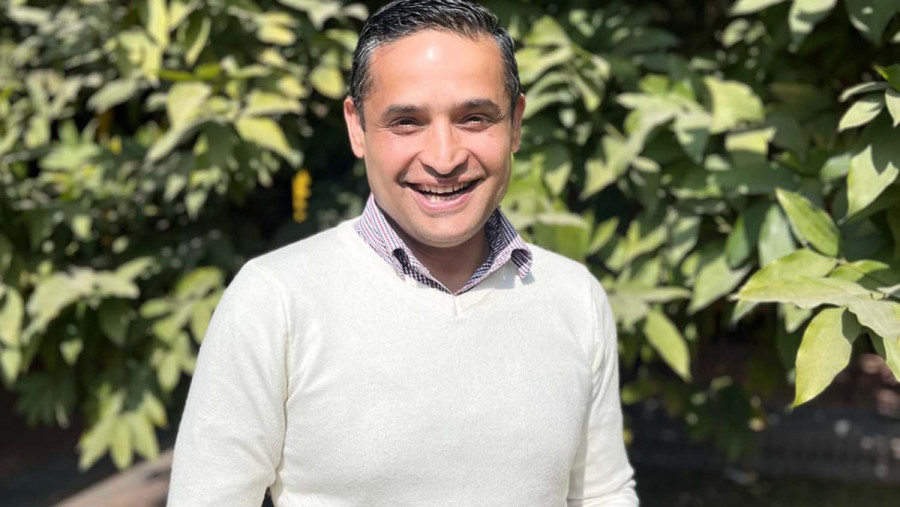Books
Storytelling in the age of digital noise
Author and podcaster Sumit Sharma Sameer discusses identity, national narratives, and the importance of discipline for writers.
Reeva Khanal
Sumit Sharma Sameer is an author and podcaster with over two decades of experience working with national and international NGOs, focusing on governance, policy, and development. He is also the creator and host of Ink & Insights, a podcast that connects Nepal with international thought leaders. He received the Kalinga Literary Festival Book Award 2022 for his debut fiction, ‘Wake Up Ali…Wake Up Now’.
In this conversation with the Post’s Reeva Khanal, Sameer reflects on his journey as a writer, the intersections of his professional experiences, and how his varied roles—as a journalist, advisor, and author—have shaped his understanding of Nepal’s evolving narrative.
Your book ‘Wake Up, Ali… Wake Up Now’ explores self-identity amidst migration and modern pressures—do you think it’s possible to reinvent one’s self-image in today’s competitive world?
It is possible. Civilisation has been reinventing itself from time immemorial, although some historians claim that ‘civilisation’ didn’t exist before the modern period—an assertion that has been contested. Every age defines its ways of living.
Human beings have always sought their self-image, which has been defined, redefined, and manufactured according to the norms of their time. A few rare individuals go beyond and refuse to be defined by the prevailing norms.
In today’s competitive world, everyone is engaged in projecting a self-image, and social media is a key tool used to enhance it. The process of reinventing one’s self-image shouldn’t be viewed negatively—the only question is how sublime that process is.
As a podcaster, what’s one conversation from Inks and Insights that shifted your perspective?
There are many conversations that have taught me valuable lessons. I have interviewed some of the finest global minds of our time—three Nobel Laureates, Booker and Pulitzer Prize-winning authors, Climate and World Food Prize Laureates, as well as renowned thinkers, philosophers, and spiritual seekers.
There is so much to learn as we grow; life itself is a continuous learning process. But if I were to draw a common thread from the lives of these luminaries, one thing stands out: they all deeply loved their work, and an extraordinary level of commitment is evident in everything they do. Through their work, they create value that helps guide society in a positive direction—and, in doing so, they become institutions in their own right.
What’s your advice to aspiring writers who feel overwhelmed by the noise of the digital age?
I don’t think I’m in a position to advise anyone—but I can certainly share my own experience. The burden we feel today isn’t just because of the digital age; in societies like ours, we also carry added layers of social and familial responsibilities. We all shoulder fragments of these, and amidst that, if one aspires to be a writer or pursue something meaningful, discipline becomes essential.
I believe aspiring writers should make time for reading, reflecting, and writing. Personally, I try to structure each day in a way that allows me to focus on my priorities.
In your book ‘Unfinished Journey: The Story of a Nation’, you connect your personal experiences with Nepal’s evolution—was there a moment when your personal narrative and Nepal’s political journey became inseparable?
Many of us are either influenced by the journey of our nation or, in some instances, our individual life paths shape the direction of national history. In that sense, the personal and political are often inseparable.
Many young people today shape their futures based on the direction the country is heading. At the same time, there are exceptional individuals within our society who have, in turn, shaped the national narrative. It works both ways—and that’s precisely why we describe societies as ‘dynamic’; they are constantly evolving.
Having worked as a television journalist, how do you view the current media landscape, where the focus often shifts to content popularity over quality? What can media professionals do to continue creating valuable content while finding innovative ways to stay financially sustainable?
We must strive to promote quality ‘content’, whether it is liked or disliked/ subscribed to or unsubscribed by crowds. The challenge is how would you survive financially in those circumstances? Now, that’s where you need to innovate and add value.
From diplomacy to storytelling to leadership—how have your diverse professional roles shaped your understanding of Nepal’s
place in the global narrative?
I believe Nepal is gradually emerging on the global stage. In today’s world, where nation-states are simultaneously ‘connected and disconnected’, each showcasing its strengths, we, as a civilisational state, have an abundance to offer.
In addition, the young generation are equipped to contribute to the global creator economy through technology and digitisation. All we need is a bit of imagination, statecraft, confidence and discipline. I hope we will soon see the leadership that will blend all these together and take us forward.
Sumit Sharma Sameer’s book recommendations
Man’s Search for Meaning
Author: Viktor E Frankl
Publisher: Beacon Press (English)
Year: 1946
Frankl emphasises that humankind is driven by the search for purpose, making the quest for meaning a fundamental need in life.
Start With Why
Author: Simon Sinek
Publisher: Portfolio
Year: 2009
In this book, the author argues that starting a company by asking the question ‘Why?’ leads to more successful outcomes.
Determined
Author: Robert Sapolsky
Publisher: Penguin Press
Year: 2023
Sapolsky says human behaviour is shaped not by a single factor but by a combination of neuroscience, psychology, and social sciences.
The 4-Hour Workweek
Author: Timothy Ferriss
Publisher: Crown Publishing Group
Year: 2007
The book challenges the traditional 9 to 5 work culture and says we can earn well without adhering to the conventional work routine.
Ashtavakra Gita
Author: Swami Chinmayananda
Publisher: Chinmaya Publications
Year: 2018
This Vedantic book by Chinmayananda explores profound philosophical teachings on the nature of self-realisation and the oneness of existence.




 21.11°C Kathmandu
21.11°C Kathmandu










